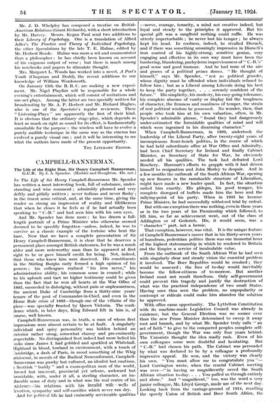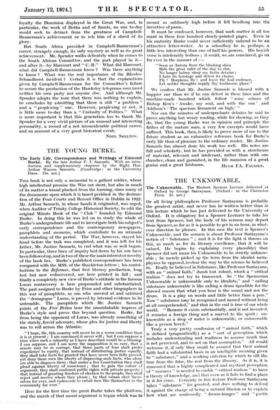CAMPBELL-BANNERMAN.
The Life of the Right Hon. Sir Henry Campbell-Bannerman, G.C.B. By J. A. Spender. (Hodder and Stoughton. 42s. not.) IN The Life of Sir Henry Campbell-Bannerman Mr. Spender has written a most interesting book, full of substance, under- standing and wise comment ; admirably planned and very deftly and pithily written ; never tedious and never flashy ; in the truest sense critical, and, at the same time, giving the reader so strong an impression of reality and lifelikeness that when he closes it he feels as if he had actually been speaking to "C.-B." and had seen him with his own eyes.
And Mr. Spender has done more : he has drawn a full- length portrait of a Prime Minister who otherwise seemed doomed to be speedily forgotten—unless, indeed, he was to survive as a classic example of the tortoise who beat the hare. Now that we have a complete presentation of Sir Henry Campbell-Bannerman, it is clear that he deserves a permanent place amongst British statesmen, for he was a much abler and more noteworthy man than he appeared at first sight to be or gave himself credit for being. Not, indeed, that those who knew him were deceived. His constituents in the Stirling Burghs early formed a high opinion of his powers ; his colleagues realized "his iron nerve," his administrative ability, his common sense in council ; while to his aplomb and tact no higher testimony could be given than the fact that he won all hearts at the War Office of 1885, succeeded in dislodging, without pain or unpleasantness, the ancient Duke of Cambridge from a thirty-nine years, tenure of the post of Commander-in-Chief, and even in the Home Rule crisis of 1893—though one of the villains of the piece—was specially trusted by Queen Victoria. The confi- dence which, in later days, King Edward felt in him is, of 2ourse, well known.
Campbell-Bannerman was, in truth, a man of whom first impressions were almost certain to be at fault. A singularly individual and spicy personality was hidden behind an exterior rather smug, somewhat clumsy and pre-eminently respectable. No distinguished Scot indeed had more belied his 'ooks since James I. had gobbled and sparkled at Whitehall. Highland in blood, lowland in environment, with a touch of :Ambridge, a dash of Paris, in mood something of the Whig Lristocrat, in morals of the Radical Nonconformist, Campbell- Bannerman was pawky but cultured, an idealist but cautious, t Scottish " buddy " and a cosmopolitan man of the world, hrewd but innocent, provincial yet urbane, awkward but brmidable, with, under it all, a sterling character, an im- placable sense of duty and in what was the real centre of his mistence—his relations with his invalid wife—wells of ievotion, sympathy and self-sacrifice which never ran dry. And for political life he had eminently serviceable qualities
—nerve, courage, tenacity, a mind not creative indeed, but loyal and steady to the principles it approved. But his special gift was a sangfroid nothing could ruffle. He was utterly imperturbable ; he never lost his temper ; he always kept his head. In coolness, indeed, he rivalled Disraeli, and if there was something amazingly impressive in Disraeli's iron control of his highly-strung, sensitive genius, very engaging and effective in its own way must have been the
lumbering, blundering, pachyderm imperviousness of" C.-B.'s" good sense and good humour. And he had none of the airs and graces of a political prima donna. "He thought of himself," says Mr. Spender, "not as political grandee, whose dignity must be offended when individuals refused to
follow him ; but as a Liberal among Liberals doing his best to keep the party together, . . . serenely confident of the future." His simplicity, his modesty, his easy-going tolerance, his complete absence of vanity or display hid the toughness of character, the firmness and manliness of temper, the strain of real political wisdom he possessed. No wonder, then, that people who took him at his own valuation, often, in Mr. Spender's admirable phrase, "found they had dangerously under-estimated the formidable qualities of mind and will which were ingrained in his disarming character."
When Campbell-Bannerman, in 1899, undertook the leadership of the Liberal Party, after twenty-eight years of inconspicuous front-bench politics, in the course of which he had held subordinate office at War Office and Admiralty, had been Chief Secretary for Ireland and finally Cabinet Minister, as Secretary of State for War, he obviously needed all his qualities. The task had defeated Lord Rosebery. Harcourt's efforts to grapple with it had driven himself to resignation and John Morley to despair. And in a few months the outbreak of the South African War, opening up new fissures in the ramshackle structure of Liberalism, might have made a new leader quail. In fact, the situation suited him exactly. His phlegm, his good temper, his complete disregard of buffets made him the hero and the rallying-point of his party. When in 1905 he became Prime Minister, he had successfully withstood trial by ordeal. But with one exception there was nothing, even in these years or in the two years of his Premiership which followed, to lift him, so far as achievement went, out of the class of Addington or of Goderich. His, it would seem, was a " character " part, not a heroic.
That exception, however, was vital. It is the unique feature of Campbell-Bannerman's career that in his thirty-seven years of humdrum, pedestrian politics there was one immortal hour of the highest statesmanship in which he rendered to Britain and the Empire a service of incalculable value.
From the outbreak of the South African War he had seen with singularly clear and steady vision the essential problem it involved. The Boer Republics would be crushed ; they would be annexed ; the foes of to-day would inevitably become the fellow-citizens of to-morrow. But another Ireland must not result therefrom. Only self-government could prevent this tragedy and justify the destruction of what was the practical independence of two small States. Having once thus seen the problem, no unpopularity or contempt or ridicule could make him abandon the solution he approved.
With office came opportunity. The Lyttelton Constitution with its machine-made Legislative Council was already in existence, but the General Election was no sooner over than the new Prime Minister determined to sweep it away root and branch, and by what Mr. Spender truly calls "an act of faith" to give to the conquered peoples complete self- government, though the War was only four years behind. The Unionists thought the idea madly rash. Even of his own colleagues some were doubtful and hesitating. But "C.-B." had chosen his path. The Cabinet was persuaded by what was declared to be by a colleague a profoundly impressive appeal. He won, and the victory was clearly his own. "You must allow me to congratulate you "— Lord Carrington wrote, when the crucial Cabinet meeting was over—" in having so magnificently saved the South African situation to-day.. . . You pulled us through entirely and alone." And "magnificent," too, was the word a very junior colleague, Mr. Lloyd George, made use of the next day, Looking back from the vantage-ground of 1924, recalling the speedy Union of British and Boer South Africa, the loyalty the Dominion displayed in the Great War, and, in particular, the work of Botha and of Smuts, no one to-day would seek to detract from the greatness of Campbell- Bannerman's achievement or to rob him of a shred of its glory.
But South Africa provided in Campbell-Bannerman's career, strangely enough, its only mystery as well as its great achievement. Mr. Spender walks delicately when he comes to the South African Committee, and the part played in it— and after it—by Harcourt and "C.-B." What did Harcourt, what did Campbell-Bannerman know ? Was there anything to know ? What was the real importance of the Rhodes- Schnadhorst incident ? Certain it is that the explanations given by Campbell-Bannerman for the Committee's failure to secure the production of the Hawksley telegrams convinced neither his own party nor anyone else. And although Mr. Spender adopts the tone that there was nothing to explain, he concludes by admitting that there is still "a problem" and a " perplexing " one. However, perplexing or not, it is little more to-day than a "Curiosity of Politics." What is more important is that this generation has to thank Mr. Spender for a very vivid picture of an unusual and interesting personality, a record of a not inconsiderable political career, and an account of a very great historical event.
NOEL SKELTON.







































 Previous page
Previous page